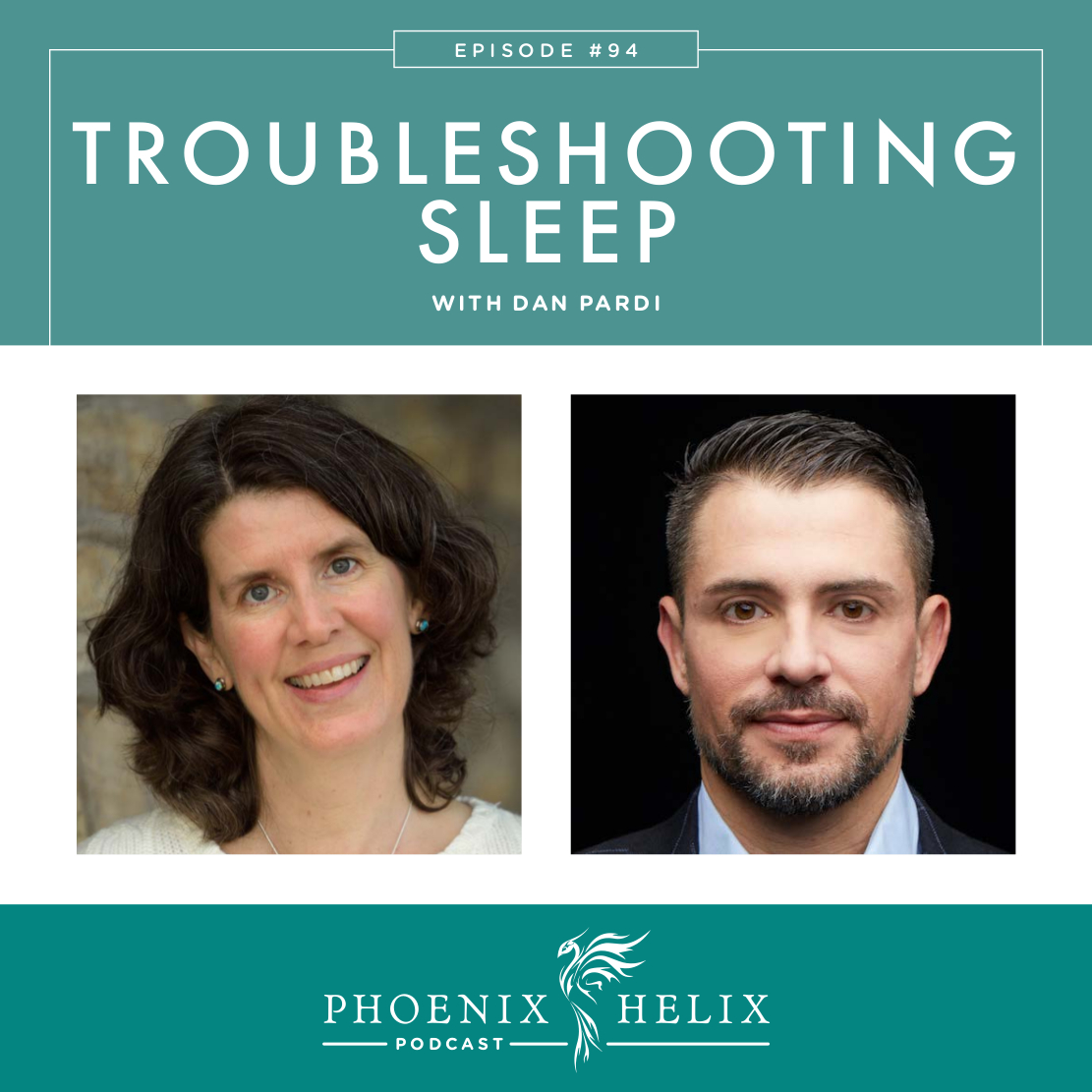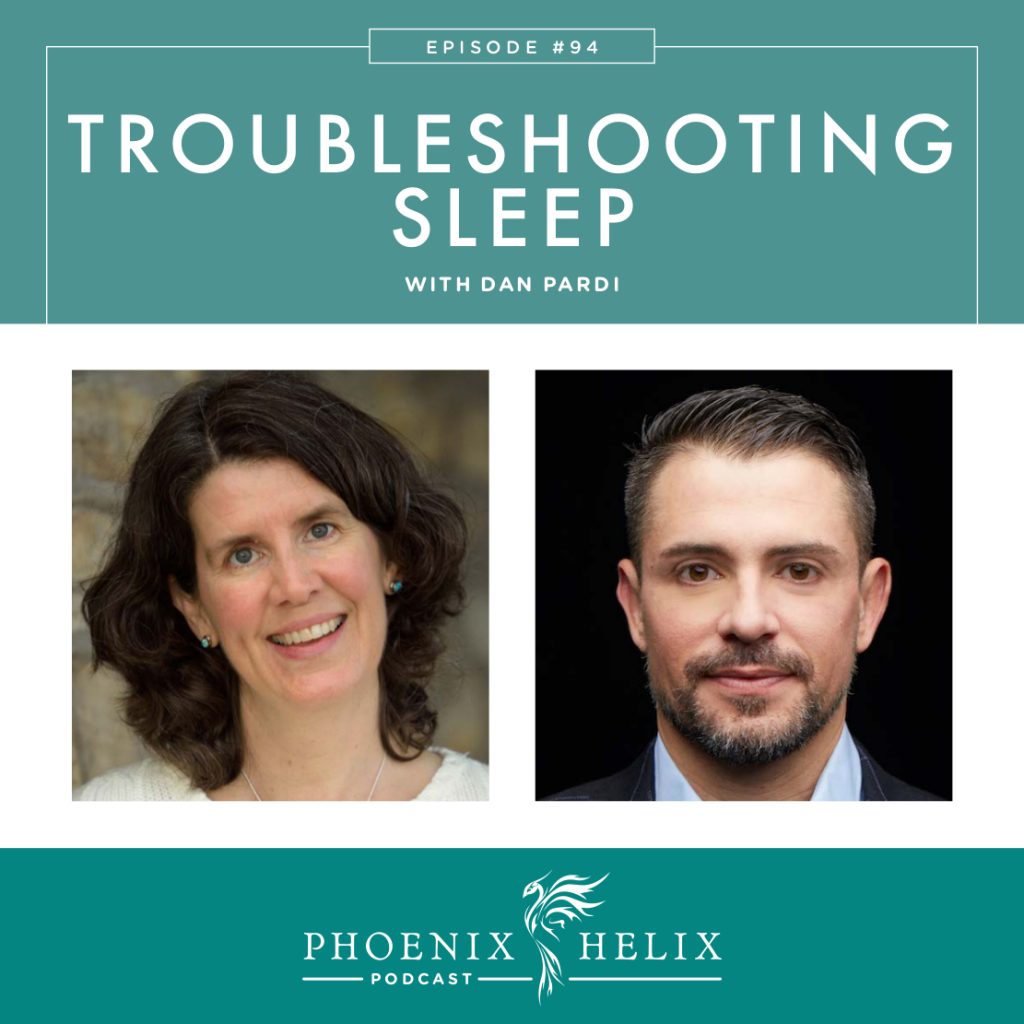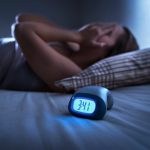Sleep and Autoimmunity
Sleep is essential to our bodies’ ability to heal. Yet we live in a culture that doesn’t value sleep, so it’s common to put it at the bottom of our priority list. When life gets busy, most people will sacrifice sleep to finish their “to do” list for the day. Does that sound familiar? Here’s the problem: People with autoimmune disease require even more sleep since our body is trying to overcome a serious health challenge. In fact, many of us have experienced autoimmune flares caused by lack of sleep. At the same time, autoimmune symptoms can make sleep difficult, creating a vicious cycle. So, what do we do? My guest is Dan Pardi, a sleep expert and researcher at Stanford University in California and Leiden University in the Netherlands. He’s also the founder of HumanOS, a program designed to help people optimize their health. In this episode, we discuss why sleep is important, what habits are essential to a good night’s sleep, and how to troubleshoot advanced sleep challenges.
Listen to the Show
- Subscribe to my podcast through your favorite podcast app: iTunes, Stitcher, Google, TuneIn, Spotify, Amazon, etc.
- You can also listen to the episode right here through the player below, and if you subscribe to my newsletter you’ll get notified of future episodes.
Podcast: Play in new window | Download
Show Notes
- Intro (0:00)
- Welcoming a New Podcast Sponsor: Real Plans (1:44)
- A meal planning app that’s a wonderful time-saver. It can be used on a computer or smartphone.
- You choose the meals, and it generates shopping lists, defrost reminders, and how much time is needed to prepare and cook each recipe.
- They have hundreds of paleo AIP recipes available, and you can also personalize your meal plan according to your unique food needs, filtering for extra restrictions or adding foods back in with successful reintroductions.
- Sign up here. They have monthly, quarterly, and annual plans.
- Meet Dan (3:50)
- Dan Pardi is a sleep expert and researcher at Stanford University in California and Leiden University in the Netherlands. He’s also the founder of HumanOS.
- He first got interested in sleep research when he worked for a pharmaceutical company that developed sleep medication. Eventually, he became much more interested in the lifestyle changes that support sleep and how to help people initiate lasting habit change.
- What Happens When We Sleep? (7:57)
- Sleep is essential to the function of every single part of our body. We need alternating times of activity and rest to heal, regenerate, grow, and detoxify.
- Brain research shows that sleep is vital. Neurotoxins that develop in the brain during waking hours are cleaned and removed during sleep. And a stable environment is provide for neuroplasticity, a process essential to learning, that has also been connected to reversing disease and healing chemical sensitivity.
- There are multiple stages of sleep, and each one fills an important function. Some people make the mistake of overemphasizing the importance of deep REM sleep at the expense of others, but the stages of sleep work together like a symphony. The goal is to restore a natural pattern, not prioritize one stage over another.
- How Much Sleep Do We Need? (16:23)
- It changes over a lifetime. A baby needs about 18 hours. Children and teenagers need 9-10 hours. Adults need 7-9 hours.
- These stats indicate “time in bed” which isn’t necessarily the same as sleep time. A sleep study will give more information: sleep efficiency, WASO (wake time after sleep onset), etc. A Fitbit can also give you some of this information, if you’re curious.
- Women traditionally need more sleep than men.
- Sleep needs also vary between individuals.
- Illness increases the need for sleep. The immune system sends out sleep-inducing signals to get the rest it needs to heal. That’s one of the reasons we often need more sleep during autoimmune flares.
- Athletic activity can also increase the need for sleep, to give the body more time to recover.
- When looking at statistics for sleep and mortality, it’s a bell shaped curve. People who sleep less and people who sleep more, both have shorter life spans. We understand why sleep deprivation might shorten a life span due to the important functions of sleep. Lengthy sleep, however, is more likely a symptom than a cause. It’s a sign to look at health issues and also consider a sleep study to see if sleep apnea is interfering with restorative sleep.
- How to determine your sleep need: Try to plan your time in bed, so that you can wake up in the morning without an alarm clock. That’s called “complete sleep”.
- Foundational Practices for a Good Night’s Sleep. (24:59)
- During the day, get outside in the sunshine sometime between 9am and noon, to establish healthy circadian rhythms that support sleep. If the weather is poor, use a light therapy box to mimic the effect.
- In the evening, either wear amber glasses or modify the light settings on your screens to eliminate blue light. Dim the lights in your home in the evening as well.
- Get on a regular sleep/wake schedule. 10pm-6am works with natural light cycles, making circadian rhythms easier to establish.
- Circadian rhythms directly impact immune system function. Mis-timed circadian rhythms lead to an overactive immune system and doubles the length of time certain inflammatory compounds are active in the gut. Correcting circadian imbalance and sleep issues is essential to gut healing and autoimmune health.
- Avoid memory foam mattresses. When you sink into a mattress it creates pressure points on your body, requires more energy to turn over, and also builds up heat. All of these things disrupt sleep.
- Regulate temperature for optimal sleep: have a cool room but warm feet. If we feel too hot or too cold, that stimulates wakefulness. A hot shower or sauna before bed is also very helpful.
- Have a dark room. Tape over LED lights on plugs and appliances. Blackout curtains can also be helpful.
- Have a quiet room. Sound machines are great at masking noise. Pink noise in particular has been researched for its ability to enhance and support restorative sleep. Resource: Dreem Headband.
- Create a bedtime routine for yourself, that is relaxing and helps you wind down from your day.
- Try a breathing technique to help you fall asleep.
- Many people recommend keeping your smartphone out of the bedroom, because it can interfere with sleep in many ways: electro-magnetic fields, blue light, and their addictive quality. All of these things can interfere with sleep. Eileen keeps her smartphone out of her bedroom. Dan, however, likes his phone in the bedroom and uses it as part of his wind-down routine. We each need to find what works for us. If you keep your phone in your bedroom: put it in airplane mode, adjust the light settings to simulate night instead of daytime, and mindfully use it in ways that are relaxing to you rather than stimulating. There are also bedtime story podcasts and apps.
- Thank You to Our Podcast Sponsor – Paleo on the Go (52:35)
- A frozen meal delivery service, they have a large menu of items for the paleo autoimmune protocol (AIP).
- Use the code PHOENIX for 10% off your first order.
- Is Napping Beneficial? (54:24)
- Napping is a natural human behavior, and it can be very restorative. A 20 minute nap can improve mental function for the next 6-9 hours.
- If you’re not getting enough sleep at night and you have the opportunity to nap during the day, take it. Release yourself from any pressure to fall asleep. 20 minutes of simple rest can also be beneficial, and we’re more likely to fall asleep if we aren’t stressed about it.
- You can also experiment with longer naps.
- As long as naps don’t cause insomnia for you at night, they are beneficial.
- What Is Biphasic Sleep? (56:42)
- Many cultures around the world include a siesta as part of their sleep/wake pattern. They sleep approximately 6 hours at night and 2 hours during the day. In fact, this is the ancestral sleep pattern. If you’re able to do this and it works well for you, it’s a perfectly healthy way to sleep. The challenge of modern life is that many jobs make this difficult.
- What Is Sleep Restriction Therapy? (58:04)
- Severe insomnia is often caused by anxiety, and then poor sleep often increases anxiety, creating a vicious cycle. Sleep restriction therapy is a form of cognitive behavior therapy that breaks through this pattern. In a very structured way, you deny your body sleep until it becomes so tired that anxiety no longer keeps you awake, and then slowly you are able to create a longer, healthy sleep pattern.
- What Is Sleep Apnea? (1:00:25)
- Sleep apnea occurs when the upper airway becomes blocked repeatedly during sleep, reducing or completely stopping airflow. Most people aren’t aware they have it
- Common signs: Non-restorative sleep (sleepiness during the day in spite of getting a full night’s sleep at night). Snoring. Brain fog (poor cognitive function).
- Weight gain also makes people more vulnerable to this condition, and sleep apnea also increase weight gain, creating another vicious cycle.
- Sleep apnea is very detrimental to health and connected to increased risk for a wide variety of medical conditions.
- Diagnosis: through an overnight sleep study at a sleep clinic.
- Treatment: For mild sleep apnea, oral appliances are an option. A CPAP machine is the most common treatment for severe apnea.
- Sleep Supplements (1:03:50)
- The most common sleep supplement is melatonin and it’s usually taken in high amounts to produce a drug-like effect: 3 mg is 65 times what the body produces naturally. Dan recommends lower amounts that more closely match natural hormone levels for healthy circadian rhythms: .3 mg (300 mcg) instead.
- There are a lot of other supplements recommended for sleep as well, but research is limited.
- Food can also impact sleep.
- Sleep Drugs (1:07:30)
- Prescription sleep medication can be helpful in certain circumstances, but they are dangerous with long-term use. These medications help you fall asleep, but they reduce the amount of slow-wave sleep that is essential to brain and overall health. Long-term use of sleep medication increases the risk of Alzheimer’s and overall mortality.
- Outro (1:08:45)
- You can keep up with Dan’s work through his website, HumanOS.me. It has multiple articles and podcasts related to sleep. The website also offers a complete program for mastering health. Enter the code PHOENIXHELIX to try the first month’s membership for just $1. Dan also has a podcast: HumanOS Radio.
- Eileen (your podcast host) is the author of multiple books, written to help people thrive with autoimmune disease. Learn more on the Books Page.
- If you like this podcast, follow or subscribe through your favorite podcast app. You can also subscribe to Eileen’s biweekly newsletter.
- Check out the entire archive of podcast episodes.
You May Also Be Interested In
Spreading the Word
If you like the podcast, please leave a positive review in iTunes. It would mean the world to me, and also helps others find the podcast. Here are some quick instructions using your iPhone:
- If you are already subscribed to my podcast: (1) Click the purple podcast icon. (2) At the bottom of the screen, click Library. (3) At the top of the screen, click Shows. (4) Click the Phoenix Helix podcast image. (5) Scroll down the page, and you’ll see Ratings and Reviews. Scroll down a little bit more and click on Write a Review. This will bring up the review screen. Tap 5 stars (if you love the podcast), and then click in the title box, and it will bring up the keyboard. Enter a title and short review. (6) Click Send in the upper right corner. (7) Thank you! Positive reviews give the podcast a higher search ranking in iTunes, helping people find it and letting them know it’s a quality podcast and worth their time to listen.
- If you haven’t subscribed to my podcast: (1) Click the purple podcast icon. (2) In the lower right corner, click the magnifying class. (3) Type Phoenix Helix in the search box. (4) Click the podcast cover in the Show list. (5) If you’d like to subscribe, click the + sign at the top of the screen. (6) To write a review, scroll down the page, and you’ll see Ratings and Reviews. Scroll down a little bit more and click on Write a Review. This will bring up the review screen. Tap 5 stars (if you love the podcast), and then click in the title box, and it will bring up the keyboard. Enter a title and short review. (7) Click Send in the upper right corner. (8) Thank you! Positive reviews give the podcast a higher search ranking in iTunes, helping people find it and letting them know it’s a quality podcast and worth their time to listen.









